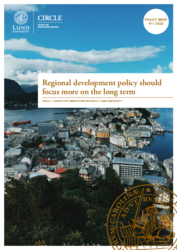Policy briefs
CIRCLE's policy brief series presents current scientific knowledge and include recommendations for future policies. These policy briefs aim at facilitating the engagement of policymakers in various issues where innovation can contribute to better solutions for the future.
Latest releases

Opportunity for wellbeing in troublesome times – Change agency and the capability approach
Around the world, communities face growing threats from climate change, health crises, and geopolitical conflicts, which can make improvement of wellbeing and quality of life difficult for the people living there. Research highlights opportunities for strengthening local governance and agency, and thereby improving citizen participation, labour markets, and public infrastructure and services.

Unexpected Innovation – Tracing change in Old Industrial Regions
Regional inequalities in Europe are growing, with many small and medium-sized industrial areas facing long-term decline. This policy brief explores how local actors contribute to transformation in old industrial regions – places often seen as resistant to change. By tracing initiatives and actions over several decades in three Swedish regions, the research highlights the role of agency in driving or resisting local development. |
CIRCLE policy briefs 2025
| Around the world, communities face growing threats from climate change, health crises, and geopolitical conflicts, which can make improvement of wellbeing and quality of life difficult for the people living there. Research highlights opportunities for strengthening local governance and agency, and thereby improving citizen participation, labor markets, and public infrastructure and services. | 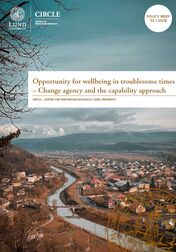 |
| Regional inequalities in Europe are growing, with many small and medium-sized industrial areas facing long-term decline. This policy brief explores how local actors contribute to transformation in old industrial regions – places often seen as resistant to change. By tracing initiatives and actions over several decades in three Swedish regions, the research highlights the role of agency in driving or resisting local development. | 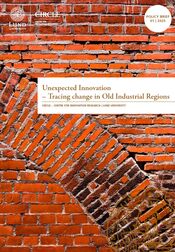 |
| Policy brief 01-2025.pdf (1.4 Mb). |
CIRCLE policy briefs 2024
| Has the era of neoliberal globalisation come to an end? We delve into the shifting landscape of economic relationships and look at the changes in macro-economic trends and policy shifts and propose rescaling as an interpretative lens to study and articulate these changes and the road ahead. | |
| Policy brief 02-2024.pdf (3,7 Mb). |
| For policy makers interested in driving regional innovation and development by establishing new universities, it is important to recognize the complexity and path dependent nature of the process. Regional engagement of new universities is a balancing act between top-down policy goals and their national and global aspirations. At the micro-level, the role of individual faculty and their motivations and logics need to be considered. | 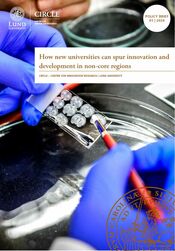 |
| Policy brief 01-2024.pdf (2,3 Mb). |
CIRCLE policy briefs 2023
| By moving towards responsible and shorter value chains, regional development holds the potential to address several societal challenges at the same time – greenhouse gas emissions, exploitation of cheap-labour regimes, and long-term local and regional development. However, it takes policy measures to succeed. | |
| Policy brief 02-2023.pdf (414 Kb). |
| Open Source Software has become an important knowledge asset in modern economies and has gained increasing traction in the last two decades. Considering its positive impact on the global economy, it is important to strengthen the skill base and the incentive to invest in Open Source Software. | 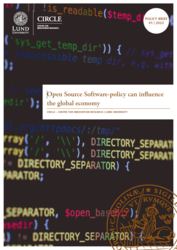 |
| Policy brief 01-2023.pdf (586 Kb) |
CIRCLE policy briefs 2022
| Policy-makers, industry and civil society all aim for a transition towards a sustainable circular economy for packaging in Germany. Despite this shared goal, Germany’s packaging waste footprint is continuously increasing, showing a large gap between ambition and practice in the sector. | |
| Policy brief 03-2022 (Pdf, 540 Kb) |
| The EU aims to become a smart, sustainable and inclusive economy which requires transformational change. Some key approaches are highlighted in a study which explores how policy on leadership and governance for regional economic development can be advanced by focusing on public actors’ capabilities, network positions and institutional arrangements. | 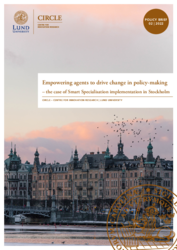 |
| Policy brief 02-2022 (Pdf, 1.5 Mb) |
The societal challenges of our time – such as Covid-19, climate change and inequalities – require regions to change, and policy plays a crucial part in supporting this change. A study which leads the way for policy on regional development by identifying why, how, and under which conditions local and regional actors can shape the future of a region. |
| |
| Policy brief 01-2022 (Pdf, 917 Kb) |

